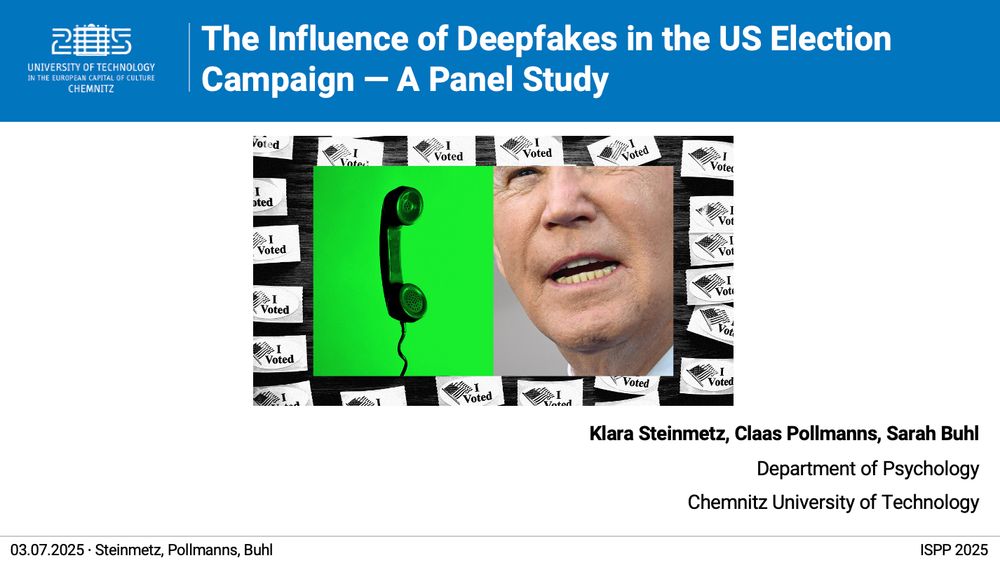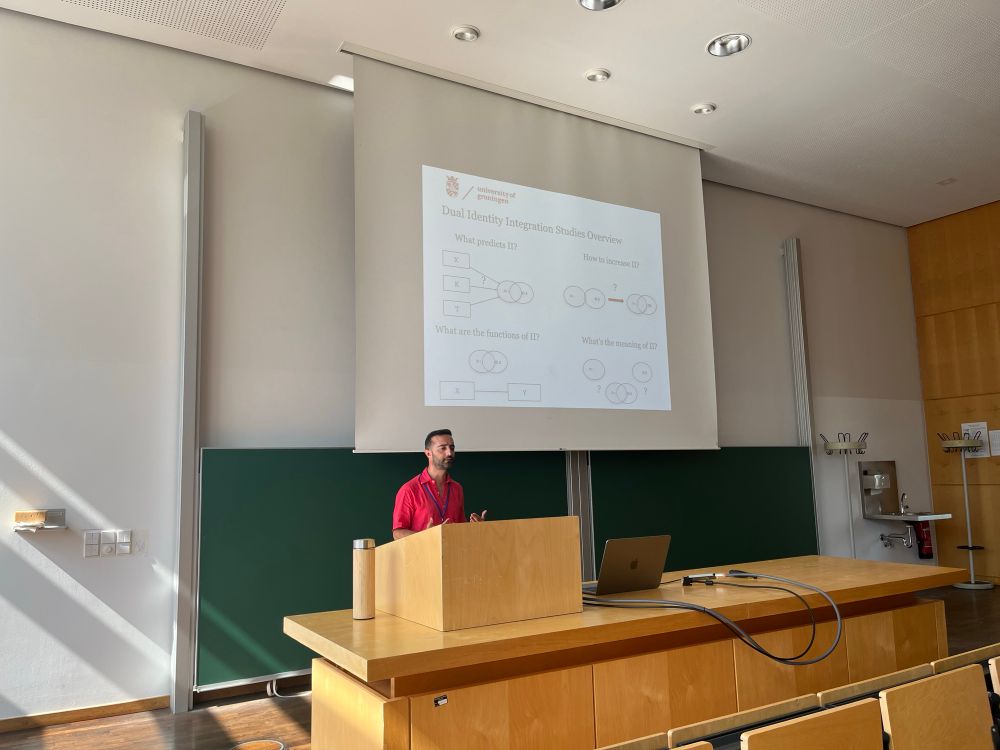
You can join the colloquium via the following link:
univienna.zoom.us/j/6675566222...
@srhbuhl.bsky.social
PhD Candidate @TU Chemnitz | Social and Feminist Psychology | she/her Member of @polpsynetde.bsky.social Organizing Team

You can join the colloquium via the following link:
univienna.zoom.us/j/6675566222...

Join us for our next Political Psychology Lunch with @klarasteinmetz.bsky.social, who will present on: “Identifying Democratic Sophistication“
Link below⬇️
New Paper by my PhD student Anni Schröder: German Version of 4D-Scale (Shuman et al., 2024) on managing privileged group identity. Open Access in Measurement Instruments for the Social Sciences doi.org/10.5964/miss...
17.07.2025 14:09 — 👍 6 🔁 4 💬 1 📌 0You can join the colloquium via the following link: univienna.zoom.us/j/6208930111...
08.07.2025 13:41 — 👍 1 🔁 1 💬 0 📌 0Join us on July 25 for our next talk by @rasmusmoering.bsky.social: “Towards the Generalization of Status Threat – Early Reflections”
Link below⬇️

„117 Menschen wurden in Deutschland seit der Wiedervereinigung 1990 von rechtsmotivierten Tätern getötet – so steht es in der Statistik der Behörden. Aber eine Langzeitrecherche der ZEIT zeigt: Tatsächlich gab es mindestens 203 Todesopfer, 86 von ihnen fehlen also in den offiziellen Zahlen.“
07.07.2025 09:16 — 👍 173 🔁 65 💬 3 📌 1
Thank you so much @ispp-pops.bsky.social for the opportunity to present our research on Deepfakes and their potential threat in political contexts. What an honour to present among all of these brilliant colleagues. #politicalpsychology #ispp2025
05.07.2025 07:29 — 👍 8 🔁 3 💬 0 📌 0
A person giving an oral presentation at a scientific conference.
Sunday Morning in Prague: I presented our research on the percetion of criminal offenders on the final day of the #ISPP2025 conference. I enjoyed it very much to meet so many friends and colleagues again after a long time.
06.07.2025 10:42 — 👍 13 🔁 1 💬 0 📌 1
A person giving an oral presentation at a scientific conference.
@srhbuhl.bsky.social presented her work on masculinity threat in the light of recent gender-egalitarian shifts on the final day of the #ISPP2025 meeting in Prague.
06.07.2025 10:50 — 👍 12 🔁 1 💬 0 📌 0
And just like that, the 2025 #ISPPAcademy has wrapped! 🎉 Huge thanks to our incredible fellows for their engagement, enthusiasm, and vibrant energy throughout. My sincere gratitude also goes out to our dedicated instructors, and to my amazing assistant Sofia Jesus and the event team. 🙂 #ISPP2025
03.07.2025 12:12 — 👍 13 🔁 5 💬 0 📌 0



What a start to the 2025 #ISPPAcademy! Today, we had engaging sessions with Yasin Koc @spyasin.bsky.social and Felicia Pratto on multiple social identities and the intersection of psychological research with international humanitarian law.
@polpsyispp.bsky.social
I'm super happy I got to organize my first EASP Small Group Meeting with @spyasin.bsky.social, @miweissflog.bsky.social, and my colleague Anni. Excited for all the great things our wonderful new network will bring!
28.06.2025 13:16 — 👍 5 🔁 0 💬 1 📌 0
Closing our workshop series at #IntersectionalitySGM with Janine Dieckmann from Jena, who challenge us to rethink not just what we research on discrimination—but how. Community-based participatory research offers a powerful path to center lived experience and share power in knowledge production.
28.06.2025 07:20 — 👍 6 🔁 1 💬 0 📌 0
Just heard @spyasin.bsky.social speak at our #IntersectionalitySGM – the perfect way to end Day 2!
Drawing on a decade of research, he unpacked what happens when multiple identities clash – and how identity integration & gateway groups can support wellbeing across contexts.

We have the privilege to have Tabea Hassler from Zurich to give us a workshop titled Working Together to Make Science Stronger and More Fun. The Swiss LGBTIQ+ Panel follows 3,500+ participants annually to capture shifts in well-being, inclusion, and stress across identities. #intersectionalitySGM
27.06.2025 08:53 — 👍 6 🔁 1 💬 0 📌 0
Starting the final symposium of #IntersectionalitySGM with Aydin Bayad from Bielefeld, who shows that how rejection is framed—who is targeted, who is blamed—shapes postmigrants’ sense of belonging and political engagement in Germany.
27.06.2025 11:37 — 👍 4 🔁 1 💬 0 📌 0
When identities don’t “fit”
Béatrice Sternberg from Paris Nanterre shows that North African gay men in France face intersectional invisibility when their identities are seen as incongruent—making them less memorable, but also less threatening. A double-edged form of bias. #IntersectionalitySGM

Discrimination spills over
Tamino Konur from Kent shows that ethnic discrimination doesn’t just shape ethnic identity—it also impacts gender identity. Ethnic-minority men may lean into masculinity to regain status, especially if high in SDO. A complex ripple effect of bias. #IntersectionalitySGM

Learning Blackness in white spaces
Tugçe Aral from Potsdam explores how Black youth in Germany develop ethnic-racial identity. Through early socialization and intersectional reflection, identity is shaped by both marginalization and community. #IntersectionalitySGM

Final talk of the day: Who do we trust—and why?
Yagmur Güleç from Wuppertal shows that trust toward immigrants depends less on migration status and more on religion, ethnicity, and education. Intersectional cues shape who’s seen as trustworthy—in Germany and Turkey alike. #IntersectionalitySGM

Kicking off Day 2 of #IntersectionalitySGM with a bang! Anna Becker from Leipzig dives into the tension female leaders feel between gender and leadership norms—revealing how this clash can fuel both queen bee and imposter responses. Let’s go!
27.06.2025 07:20 — 👍 4 🔁 1 💬 0 📌 0
Whose equality counts?
Khatijatusshalihah from ANU shows how Muslim women in Australia face compounded barriers at work—where gender, race, and visible faith intersect. Interviews reveal discrimination, misrecognition, and resistance. #IntersectionalitySGM #WorkplaceBias

Who gets to belong in academia?
Lea Luttenberger from Humboldt explores how intersecting identities shape experiences in German academia. Through participatory methods, Lea highlights class, race, and academic identity as entangled—and reveals the limits of standard surveys. #IntersectionalitySGM

Angelo Cusimano from CUNY offers a sweeping keynote lecture on intersectional theory, methods, and tools—centering LGBTQ, multiracial, and multiply marginalized groups. Intersectionality isn’t a buzzword—it’s a blueprint for more inclusive, power-aware research. #IntersectionalitySGM
26.06.2025 14:07 — 👍 4 🔁 1 💬 0 📌 0
Who gets hired in IT?
Lou Dörr from Kaiserslautern-Landau shows that cis and trans* men are favored for masculine roles like IT consultant. Nonbinary applicants—especially with feminine birth names—face the most bias. Trans* women were liked, but not hired. #IntersectionalitySGM #TransRights

What happens under pressure?
Lucile Bottein from Paris investigates how emotional stress impacts bias control in split-second judgments of competence. Under threat-of-scream conditions, participants rely more on stereotypes—boosting White men, disadvantaging Black women. #IntersectionalitySGM

Can pronouns override appearance?
Verena Heidrich from Mainz explores how people categorize gender when phenotypic cues and pronouns clash. Findings show that strong essentialist beliefs make people cling to binaries, subtyping non-binary identities instead of updating beliefs. #IntersectionalitySGM

Beyond the monolith:
William Lodge II from Cornell shows that transgender women in India aren’t a uniform group. Using latent class analysis, he finds that economic precarity and social marginalization shape HIV care differently across subgroups—demanding tailored interventions #IntersectionalitySGM

How do we “do” intersectionality in practice?
Gemma Hunting from Simon Fraser offers a hands-on workshop applying the Intersectionality-Based Policy Analysis (IBPA) Framework to mental health. A powerful guide for turning theory into action. #IntersectionalitySGM #MentalHealthJustice

How do teachers judge students?
Zoé Viviand from Lyon shows that disability, gender, and class interact to shape teachers’ perceptions. Disabled students aren’t just judged on warmth and competence—but also assertiveness. Intersectionality reveals complex biases in classroom. #IntersectionalitySGM